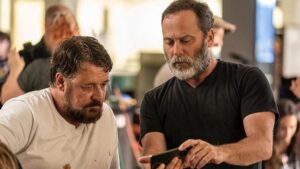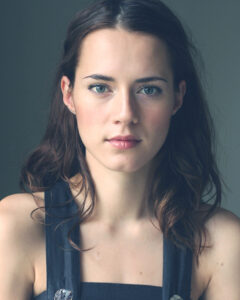
Russell Crowe (The Man) stars in a psychological road rage film that quickly turns into a horror film. Rachel, played by New Zealand actress, Caren Pistorius, a single mom, is running late to work when she ‘lays on the horn’ at a traffic light at “The Man.” Turns out to be a deadly idea as he quickly hunts her down and lets her know he doesn’t care about her excuse of having a bad day, he threatens to show her a “really bad day.” A game of cat and mouse ensues, with deadly outcomes. The premise—you never know when provoking a stranger if they are on the edge of becoming unhinged.
Here’s my phone interview with directer Derrick Borte, conducted on August 11. He talked about collaborating with Crowe to create the character along with his praise for actress Caren Pistorius.
Sarah Knight Adamson:
Wow. What an intense film. Russell Crowe is terrifying. How did you direct him to play this part?
Derrick Borte:
For someone like Russell, there are times where, we did a lot of prep work, to just sort of try to find this character together. But other times, I just got out of his way and tried to capture what he was bringing every day. It was an amazing process.
Sarah Knight Adamson:
Did Russell Crowe have any suggestions for his character in those meetings of “The Man” that he played, an ambiguous person?

Derrick Borte:
Absolutely. I mean, we did a lot of work together, to try to find his character. And, for an actor to try to find ways to connect or play in some sort of humanity through a character that’s lost all of that, is a challenge. And, we really tried to find that, on a daily basis and look into what it is, that allows someone to get to that stage, where they feel so invisible, that they feel like their only voice is violence and something that seems to be very prevalent these days. And, it was a great collaborative effort to try to find that.
Sarah Knight Adamson:
Oh, thank you for that. What do you think was Russell’s most difficult scene to film.

Derrick Borte:
That’s a good question. I mean, I don’t think any of them were difficult for him. I think that he’s amazingly talented and experienced and just kind of goes about it in a workman way. And, I think that each scene brought with it different challenges. I mean, acting while driving a vehicle at those kinds of speeds, that to me, has got to be difficult. Actual driving and making sure that you’re being as safe as you can, but still staying in character, that’s a difficult thing, I’m sure. And, I think that each scene, as I said, brings its own challenges and yet, because he comes to work every day and gets everyone on the crew, including myself to raise their game up, to try to be the same universe as his.
Sarah Knight Adamson:
I was wondering, and I am a huge Russell Crowe fan, let’s just get it out there. I am… “Gladiator” is in my top five and “A Beautiful Mind,” it’s right up there as well. I’ve seen most of his films. I was wondering, this character is just so evil. I was wondering why he would agree to play that character? I know there was a little bit about it in the press notes, but I just wonder if you could shed any light on that.

Derrick Borte:
Actors look for challenges. I think this is something different than he’s done before. He said, “It scared him”. And, that’s what allowed him to do some of the amazing things he’s done in his careers, by doing things that scare him. And, I think that this is just another one of those situations where he pushes himself, he doesn’t want to do something that he’s done before.
Sarah Knight Adamson: Caren Pistorius, the young mom. I immediately saw a similarity in her looks and mannerisms to the Academy Award-winning, Jennifer Connelly in 2001, “A Beautiful Mind.” Has anyone said that to her, to you, or did you see a similarity?

Derrick Borte:
I didn’t see that specific similarity, no. I mean, I saw great acting inward, and I saw someone who felt very real and approachable and yet just commanded your attention on screen. And, when it came time to step up to Russell’s character, she showed a strength that felt very authentic to me.
Sarah Knight Adamson:
She was excellent in the movie and Russell, he’s just upped his game, it’s an unbelievable film. I want to thank you for bringing us that, going back to Caren a little bit. You did mention some qualities and reasons for her excellent portrayal, but what else do you think she brought to the film?

Derrick Borte:
She has an authenticity to her and a vulnerability. And then, when her strength is needed to go where she goes in the film, it all just feels real, it feels believable. And as far as on camera, I think that those are the things she brings to the film in general. And, she’s also a real pro, has a great sense of humor and to help sometimes lighten up things under very tense circumstances while we’re shooting crazy days in the New Orleans heat and hurricanes and you name it.
Sarah Knight Adamson:
I read that your hope for the film is to generate conversations about how people treat each other. And I tell you, at the beginning of the pandemic, I saw people in my local garden centers having meltdowns, public meltdowns because they had to wait too long for a salesperson. There was really loud screaming, yelling, I couldn’t believe it could, could you speak to this, please?
Derrick Borte:
I think it’s something that’s becoming more and more prevalent all the time. There’s a lack of stability and level of entitlement. I think it is sometimes the excuse of being an individual at first, or it has to do with freedom. And I think that individualism and collectivism are not mutually exclusive. I think you can have both and subscribed to both. And, I think that we’ve reached a point where this rage is just under the surface, and whether it’s honking your horn at someone at a stoplight or fighting over the last roll of toilet paper in the supermarket, And, I think that, as far as the conversation goes, I think that, it’s worth talking about, it’s worth asking what’s gotten us to this point where we can’t just have a conversation about our problems in the hopes of solving it versus always being right.
Sarah Knight Adamson:
How excited are you for your film to open in theaters?
Derrick Borte:
I mean, it’s amazingly exciting to be rolled out theaters, and it’s tempered a little bit by the responsibility of wanting to know that, that’s a safe environment for people. And, I think that the studio and the theater chains have all gathered to ensure a protocol from social distancing to touchless entry, to disinfecting seats and mask-wearing and checkerboard seating, you name it, they’ve worked together to kind of, get to the point where that experience, where people can feel safe about the experience. It’s exciting, but it’s also like I said, it carries with it a big responsibility.
Sarah Knight Adamson:
I want to thank you so much for speaking with me and best of luck with the film.
Derrick Borte:
Thank you so much. I appreciate it.
Sarah Knight Adamson© August 11, 2020
